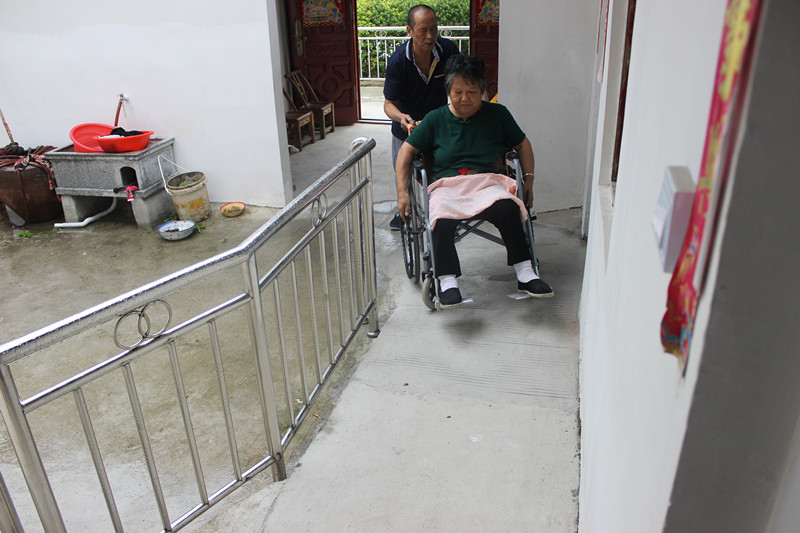Campaign aims to give disabled people dignity, independence
By Li Lei | China Daily | Updated: 2018-08-20 07:33

Yang Chuansheng pushes his wife along a ramp that makes it easier for them to enter and exit their house. CHINA DAILY
Their son works in Guangdong province, so until recently the couple relied on their married daughter, who lives in a neighboring village, to cook and clean for them, and even help them use the toilet.
"I tried to cook, but the stove was too high because I use a wheelchair," Ruan said, displaying a number of scars she sustained after being scalded when she attempted to cook.
Now, the lower-level stove and worktops make it easier for her to prepare food, meaning she and Yang are less dependent on their daughter. Every morning, Ruan guides Yang as he wheels her to the stove to cook breakfast, and she makes sure he knows where he is going when they use the ramp to move outside and enjoy cooler temperatures.
In addition, the handrails help them to use the sit-down toilet, which is both cleaner and safer than a traditional squat lavatory. The new-found independence has bolstered the couple's self-respect. Yang's disabilities meant it was almost impossible for him to use a traditional toilet without assistance, so he resorted to using an enamel pot in the bedroom, which was both insanitary and potentially dangerous.
One time he knocked the pot over and got covered in excrement. "At that moment, I wished I had been killed in the explosion," he said, recalling the humiliating experience.
The 3,500 yuan fee for the renovations to the couple's home was paid by the local branch of the disabled persons' federation.
In addition to the ramp and other infrastructure changes, the couple received special kitchen appliances, such as a kettle designed so hot liquids cannot scald the user and a cooker fitted with a voice chip that explains the function of every button on the console and allows blind people to cook safely.
During a news conference on July 25, Zhou Jian, deputy director of the rights department at the China Disabled Persons' Federation, said the renovation program has been financed by funds provided by the national lottery, and more than 2.1 million families have benefited in the past five years.
Despite that, demand still outstrips supply, according to Zhou. "An estimated 3.3 million poverty-stricken families are still in need, and we will strive for more financial support to expand the program's coverage," he said.
























